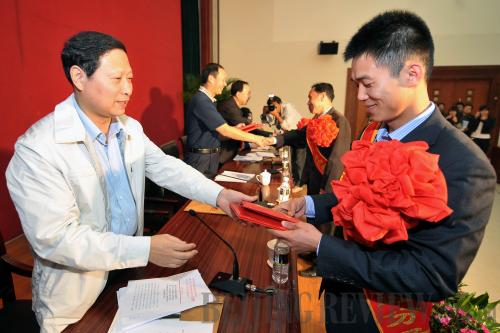|
 |
|
WELL-DESERVED PRAISE: Good Samaritans in Haikou, south China's Hainan Province, are honored on March 3 (GUO CHENG) |
Nie Lize, an associate professor at the Guangzhou-based Sun Yat-sen University, was also in favor of such a law. "It is necessary to legislate because the moral standards of Chinese people are deteriorating," he said.
However, Wang Zhongxing, a professor at the Sun Yat-sen University's Law School, doesn't think refusing to help people in need is a crime.
"We should be very cautious to handle the issue because legislation is a double-edged sword," he said. "It may encourage people to take action but it can also lead to people wrongfully accusing the innocent."
Wang said the issue was about morals rather than the law. "It is not fair to simply punish people who do not lend a helping hand," he added.
Huang Na, an associate professor at the Law School of the Chinese People's Public Security University, also opposed the idea of an all-inclusive legislation in this respect.
"The legislation should be targeted at specially designated groups, such as police officers and medical workers instead of the vast numbers of ordinary citizens," she said.
Huang's principal fear was that the "duty to rescue" legislation would lead to too many people becoming suspects and defendants.
"Those who are not technically qualified to rescue the wounded may make the victims' conditions even worse," she said. "It may also limit the rights and civil obligations of citizens when morality and ethics are legislated."
Meanwhile, many psychologists believe Wang's parents' neglect was also responsible for the accident, although the passers-by who did not stop to help must shoulder the majority of the blame.
Wang's parents, who came from Liaocheng in Shandong Province, run a small shop in the vast Foshan Hardware Market which houses more than 2,000 businesses.
The market's narrow roads are thronged with various vehicles and there are no amenities or facilities for the children of migrant workers.
According to official statistics, migrant workers' children were the victims in a third of the more than 1,000 accidents involving children that took place in Guangdong over the past year.
"A large contributing factor to these tragedies was parents' neglect," said Zeng Jinhua, Director of the Guangdong Youth and Children Research and Development Center.
Guangdong is home to a migrant population of about 37 million, which constitutes a third of the province's total population and a seventh of the country's migrant population.
Because of struggling finances, migrant workers are usually unable to afford nurseries and day care centers to look after their children.
"Parents don't have time to spend with their kids," Zeng said. "So their children are usually playing or walking alone. That poses a great danger to these children."
Instead of lobbying for legislation that punishes people for negligence, many scholars and ordinary citizens propose that the first step in encouraging more aid and trust in society should be the protection of those who do make an effort to help. In the previous years, a number of controversial court rulings have found against people who stepped into help.
The case of Peng Yu, a young man who was accused of harming an elderly woman he was actually trying to help, is often cited as having had a negative impact on Chinese citizens' willingness to offer aid.
On November 20, 2006, an old woman fell to the ground at a bus stop in Nanjing, east China's Jiangsu Province, and broke her leg. Peng, who had alighted from the bus, felt obliged to escort her to hospital. But later the woman and her family took Peng to court and the court ruled that he should pay 40 percent of the woman's medical costs.
The court claimed the decision was taken after reasoning that if Peng had not bumped into the old woman, he would, according to what one would normally do in such a case, have left soon after taking her to the hospital and not have waited for details of her surgery.
Although Peng wasn't found guilty of any wrongdoing, the court ordered him to pay 45,876 yuan ($6,717) to the old woman. The ruling evoked strong reactions from the public and negatively influenced people who might have previously been willing to help.
| 